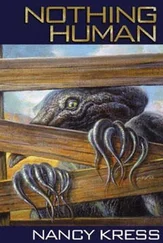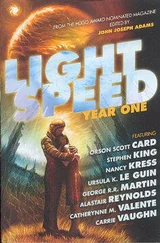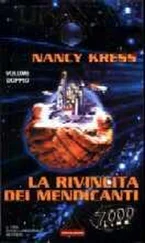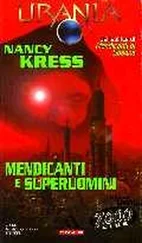This holo had really happened.
It showed the underground, including James Hubbley, capturing the duragem dissembler in an outlaw lab. The captured inventors were then forced to manufacture dissemblers in huge quantities, which were stored in small canisters completely dissolvable once opened. None had been released until the canisters had been stockpiled all over the United States. Then the clocked dissembler had been released simultaneously everywhere, so no source could be traced. I was looking at information the GSEA would give its collective life to know.
The original outlaw lab had been located in Upstate New York, in the Adirondack Mountains, near a small town called East Oleanta.
I sat quietly, letting the shapes in my mind overwhelm me. There was no use fighting them. Miranda had always said East Oleanta had been chosen at random for the Huevos Verdes project, picked by a computer-generated random program to avoid the GSEA deductive-locale programs. That’s what she had told me.
You’re a necessary part of the project, Drew, A full member.
“Okay,” Jimmy Hubbley said, when the holo had finished, “now who can tell me why we all see this here holo over and over again like this, pretty near every damn day?”
A young girl said fervently, “Because we share knowledge, us, equally. Not like the donkeys.”
“That’s fine, Ida.” Hubbley smiled at her.
A man said in a deep, upcountry voice, “We need, us, to know the facts so’s we can make good decisions about our country. The idea of an America for real human Americans. The will to get us there.”
“That’s fine,” Hubbley said. “Don’t it sound fine, soldiers?”
Someone said hesitantly, “But don’t that mean, it, that we should ask everybody in the whole country what they think? For a vote?”
There was a little stir in the room.
“If they had all the knowledge we do, Bobby, then it sure would mean that,” Hubbley said earnestly. Light shone in his pale eyes. “But they don’t know all the things we do. They ain’t had the privilege of fightin’ for freedom on the front lines. Specifically, they ain’t seen the holo of the captured lab. They don’t know what weapons we got on our side now. They might think this here revolution is hopeless, not knowing that. But we know better. So we got the obligation to decide for them, and to act in the best will of all our fellow Americans.”
Heads nodded. I could see how special they felt, Ida and Bobby and Peg, deciding so selflessly in the best interests of all Americans. Just as Francis Marion had done.
I heard Miranda’s voice in my head: They can’t possibly understand the biological and societal consequences of the project, Drew, any more than people of Kenzo Yagai’s time could foresee the social consequences of cheap ubiquitous energy. He had to go forward and develop it on the basis of his best informed projections. And so do we. They can’t really understand until it happens .
Because they were norms. Like Drew Arlen.
There was a long silence. People shifted from ham to ham or sat preternaturally still. Eyes darted at each other, then away. I could feel my own back straighten. All this tension was not over some holo they had seen “pretty near every damn day.”
Hubbley said, “I said they don’t know what we got, and I meant they don’t know what we got. But they’re sure the hail going to find out. Campbell, bring him in.”
Campbell entered from one of the many corridors, half dragging a naked, handcuffed Liver. The man was a sorry sight, barely five and a half feet to Campbell’s seven and looking even shorter as he futiley resisted being dragged. He was hunched over, his bare heels scraping the floor. He didn’t make a sound.
Hubbley said, “Is the robocam ready?”
Someone behind him said, “I just turned it on, Jimmy.”
“Good. Now, y’all know this film is the kind that cain’t be edited without self-destructin’. And you watchers out there, y’all know it too. Son, look at me when I’m talkin’.”
The captive raised his head. He made no effort to cover his genitals. I saw with a shock that his lack of height wasn’t due to bad Liver genes; he was a boy. Thirteen, maybe fourteen, and genemod. It was there in the bright green eyes, the sharp handsome line of his jaw. But he wasn’t donkey. He was a tech, those offspring of borderline families who can’t afford full genetic modification, including the expensive IQ boosters, but who aspire to be more than Livers. They buy their children the appearance mods only, and the kids grow up — early — to provide those services halfway between robots and donkey brains. My roadies were techs. At Huevos Verdes, you could argue, Kevin Baker’s grandson Jason, a Sleepless, was nonetheless a tech.
The boy looked terrified.
Hubbley said, not to the boy, “What did General Francis Marion’s young lieutenant call him?”
Peg answered fervently, “ ‘An ugly, cross, knock-kneed, hooknosed son of a bitch’!”
“Y’all see, son,” Hubbley explained kindly to the boy, “General Marion warn’t genemod. He was just the way his Lord made him. And he became the greatest hero this country ever had. Curtis, what did General Marion say was his policy when he was too outnumbered to attack the enemy directly?”
A man to my left said promptly, “ ‘Yet I pushed them so hard as in a great measure to break them up.’ ”
“Absolutely right. ‘Pushed them so hard as to break them up.’ And that’s just what we’re doin’, you watchers out there. Pushin’ y’all. This here man is a captured enemy, a worker in a genemod clinic. Parents take their innocent unborn babies to this place and turn them into something that ain’t human . Their own children. To some of us this is damn near inconceivable.”
I wanted to say that in vitro genetic modification happened before there was a ‘babe,’ that it was done to the fertilized egg in artificial biostasis. But my tongue was stuck to the roof of my mouth. The tech boy stared straight ahead, seeing nothing, like a rabbit caught in bright lights.
“Now, y’all might think that this boy is too young to be held accountable for his actions. But he’s fifteen years old. Junie, how old was Francis Marion’s nephew Gabriel Marion when he was killed fightin’ the enemy at Mount Pleasant Plantation?”
“Fourteen,” a female voice answered. From my chair, I couldn’t see her face.
Hubbley’s voice grew confidential. He leaned forward slightly, “Y’all out there see, don’t y’all? This is war. We mean it. We got the Idea what kind of country we want to live in, and we got the Will to get there. No matter what the personal cost. Earl, tell all our watchers out there at the GSEA about Mrs. Rebecca Motte.”
A man dressed in purple jacks stood awkwardly, his arms dangling loose at his side. “On May 11—”
“May 10,” Hubbley said, with a brief frown. He didn’t want any inaccuracies in his uneditable tape. Earl, rattled, took a deep breath.
“On May 10 General Marion and his men attacked Mount Pleasant Plantation, them, ’cause the British had took it for a headquarters. They made the lady and her kids move, her, into a log cabin. Her name was Mrs. Rebecca Motte. The house was too well fortified for direct attack, it, and so the general decided, him, to shoot flaming arrows and set it on fire. But they didn’t have no good bow and arrows. Lighthorse Harry Lee, who was working with General Marion, he went, him, to tell Mrs. Motte they had to burn her house down. And she went into the cabin and come out with beautiful bow and arrows, real donkey stuff. And she said, her, about her house, ‘If it were a palace, it should go.’ ” Earl sat down.
Читать дальше










